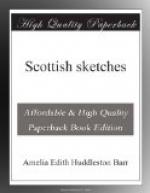Besides this great social gulf, there were political and religious ones still wider. That these differences were traditional, rather than real, made no distinction. Man have always fought as passionately for an idea as for a fact. But Dominie Tallisker was a man made for great requirements and great trusts. He took in the position with the eye of a general. He watched the two classes passing down the same streets as far apart as if separated by a continent, and he said, with a very positive look on his face, “These men are brethren and they ought to dwell in unity; and, God helping Dugald Tallisker, they will do it, yes, indeed, they will.”
CHAPTER IV.
In a year after the departure of the clan, the clachans of Crawford and Traquare had lost almost all traces of their old pastoral character. The coal pit had been opened, and great iron furnaces built almost at its mouth. Things had gone well with Crawford; the seam had proved to be unusually rich; and, though the iron had been found, not on his land, but on the extreme edge of Blair, he was quite satisfied. Farquharson had struck hands with him over it, and the Blair iron ore went to the Crawford furnaces to be smelted into pig iron.
Crawford had grown younger in the ardent life he had been leading. No one would have taken him to be fifty-five years old. He hardly thought of the past; he only told himself that he had never been as strong and clear-headed and full of endurance, and that it was probable he had yet nearly half a century before him. What could he not accomplish in that time?
But in every earthly success there is a Mordecai sitting in its gate, and Colin was the uncomfortable feature in the laird’s splendid hopes. He had lounged heartlessly to and from the works; the steady, mechanical routine of the new life oppressed him, and he had a thorough dislike for the new order of men with whom he had to come in contact. The young Crawfords had followed him about the hills with an almost canine affection and admiration. To them he was always “the young laird.” These sturdy Ayrshire and Galloway men had an old covenanting rebelliousness about them. They disputed even with Dominie Tallisker on church government; they sang Robert Burns’ most democratic songs in Crawford’s very presence.
Then Colin contrasted them physically with the great fellows he had been accustomed to see striding over the hills, and he despised the forms stunted by working in low seams and unhealthy vapors and the faces white for lack of sunshine and grimy with the all-pervading coal dust. The giants who toiled in leather masks and leather suits before the furnaces suited his taste better. When he watched them moving about amid the din and flames and white-hot metal, he thought of Vulcan and Mount AEtna, and thus threw over them the enchantments of the old Roman age. But in their real life the men disappointed him. They were vulgar and quarrelsome; the poorest Highland gillie had a vein of poetry in his nature, but these iron-workers were painfully matter of fact; they could not even understand a courtesy unless it took the shape of a glass of whiskey.




